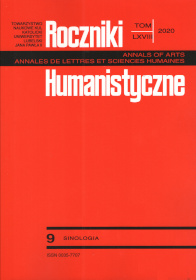System władzy w ChRL w okresie reform: Ewolucja, wyzwania, sprzeczności. Część I: lata 1978-2002
The Evolution of China’s Political System in the Reform and Opening-Up Era: Structures, Processes and Challenges. Part I: 1978-2002
Author(s): Józef PawłowskiSubject(s): Politics / Political Sciences, Governance, Public Law
Published by: Towarzystwo Naukowe KUL & Katolicki Uniwersytet Lubelski Jana Pawła II
Keywords: China’s political system; reform era; opening-up policy; Communist Party of China; one-man rule; collective leadership
Summary/Abstract: This paper examines the main features of the political system in the People’s Republic of China and the changes in the power structure of the Communist Party of China since the introduction of the reform and opening-up policy. The author analyses the key features of the decision-making process, institutions, model of governance and leadership of the PRC during the eras of Deng Xiaoping, Jiang Zemin, Hu Jintao and Xi Jinping. Since the beginning of the 1980s, China’s political system has undergone a transformation from one-man rule to a “collective leadership”, facing various challenges in governing the country and upholding the process of reform. The deepening of economic reforms, which began in the 1990s required a significant improvement in the state’s ability to govern and its adoption of a more flexible approach to the Party’s guiding ideology. As a result, China’s top decision-making bodies started to evolve into professional governing boards supported by highly educated cadres, experts and think-tanks. However, the end of Deng Xiaoping’s “strong-hand” rule led to the formation of a number of factions and interest groups within the Party’s establishment, each holding different views on the way, and the extent to which, such reforms should be pursued. During the last two decades, this factional struggle has exerted a negative influence on China’s economic and social transformation, as well as initiating the process of internal decay in the Party. Facing a growing number of challenges in China’s development and a lack of political unity within the CPC, the present leadership has strived to reorder the power structure and streamline the process of reform. Although it has managed to consolidate political power and partly eliminate some of the gravest problems, such as corruption, discord within the Party has prevailed and increased, leading to a visible decline in the reforms over the past few years, as well as to a growing number of voices demanding a thorough change in the political system. This paper concludes with remarks regarding the further evolution of the political system in the PRC, and possible developments in the Party’s leadership.
Journal: Roczniki Humanistyczne
- Issue Year: 68/2020
- Issue No: 9
- Page Range: 67-99
- Page Count: 33
- Language: Polish

